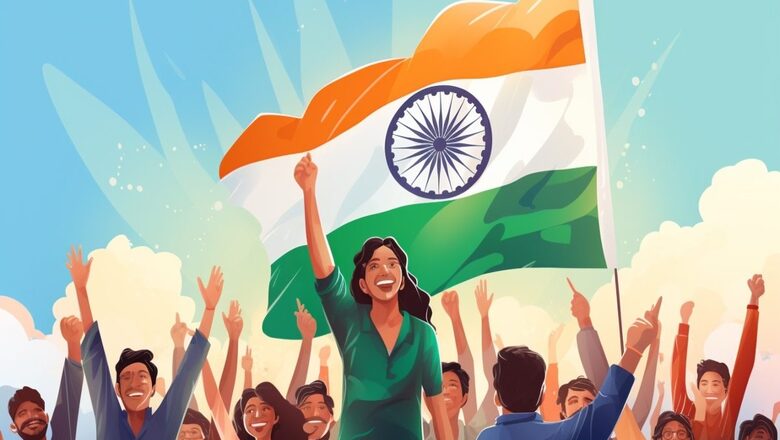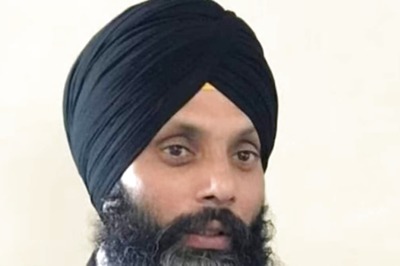
views
In the echoing pages of history, the resonance of India’s struggle for independence still reverberates—a struggle not only against external oppression but also against the internal shackles of colonial thinking. As Jawaharlal Nehru, India’s first Prime Minister, looked upon the dawn of a free nation, he spoke of a destiny that awaited, a destiny that will take a new form in the landscape of India’s progress. Yet, the initial tryst with destiny was marred by the replication of foreign norms and practices, creating a mirage of development under a colonial shadow.
The colonial era’s departure marked India’s physical freedom, but its mental captivity lingered. The early years of independence were dominated by an eagerness to emulate the West as if modernisation could only be achieved through mimicry. The Constitution, a sacred document embodying India’s aspirations, bore a semblance to colonial templates, a paradox that clung to the country’s narrative. Courts, customs, and culture followed a well-trodden path, bereft of innovation, and drenched in the belief that Westernisation and progress walked hand in hand.
However, the present is marked by India’s stride towards a new tryst with destiny—a destiny untangled from the colonial web, interlaced with indigenous innovation and resilience. This Amrit Kaal, as termed by Prime Minister Modi, symbolises a transformed nation, one unshackled by the remnants of colonial thinking. India’s metamorphosis extends across sectors, heralding self-reliance, growth, and cultural resurgence.
In this epoch, the nation’s armour is crafted in its own foundries. Defence, space, pharma, technology, IT, and even the intricate world of semiconductors are domains where India’s expertise is burgeoning. No longer confined to reliance, India strides as an exporter of defence equipment, echoing a newfound self-sufficiency that carries a hint of pride and progress.
This transformation isn’t insular; it’s altruistic. In the dangerous era of the pandemic, India exemplified compassion intertwined with capability. In a departure from the past, where the nation had leaned on others for medical aid and vaccines, the present unfolds a transformed mindset—a resolute commitment to crafting its own solutions. With three indigenous vaccines developed and a magnanimous Vaccine Maitri initiative, India extended its helping hand beyond borders, safeguarding lives and upholding its ancient value of Vasudhaiva Kutumbakam—the world is one family.
The pandemic unveiled a nation’s heart, but it was also a stage for economic agility. As countries grappled with inflation and stagnation, India surged. The Morgan Stanley report resonates with this truth. India, under Prime Minister Modi’s leadership, stands resilient and steadfast, emerging as the world’s fastest-growing economy. This achievement isn’t merely about economic numbers but a testament to the spirit of a nation that refuses to bow to adversity.
Prime Minister Modi’s leadership isn’t confined to economics; it’s about shattering barriers, both tangible and intangible. The eradication of language barriers addresses historical state tensions and sub-nationalistic sentiments. A focus on education in regional languages bridges divides, ensuring inclusivity and a sense of belonging. The revival of ancient educational institutions, temples, and new changes in criminal laws speaks of a society reclaiming its heritage and, thereby, its self-assurance.
Through these earnest endeavors, the nation’s youth are now embracing their spiritual roots, culture, and values. A surge in tourists at religious sites, be it Kedarnath or Tirupati, attests to this change.
This cultural renaissance reflects the positive outcomes of the government’s initiatives, exemplified by the peaceful resolution of the Ram Janmabhoomi dispute. As PM Modi envisions, India’s trajectory shifts from the last thousand years of resistance to the next thousand years of victorious progress, ushering in a new era of advancement.
In this voyage of transformation, India reclaims its identity and, consequently, its global standing. The world watches as the nation shakes off its colonial hangover and forges ahead with valour. India’s wisdom, revered for centuries, converges with a contemporary prowess that’s woven into every sector and endeavour. The nation is reclaiming its status as a wellspring of knowledge, underpinned by the values that have been its bedrock since antiquity.
As India looks upward, it doesn’t only see the sky; it sees a canvas for growth, innovation, and progress. The quest for self-reliance marries seamlessly with an unwavering connection to its roots. The legacy of colonial mimicry is being overtaken by a rekindled spirit of self-discovery and authenticity. This new tryst with destiny isn’t merely a promise; it’s a reality etched in every step the nation takes toward a future that’s distinctly Indian.
Rahul Kaushik is an author and a political analyst. He tweets @kaushkrahul. Views expressed in the above piece are personal and solely that of the author. They do not necessarily reflect News18’s views.




















Comments
0 comment